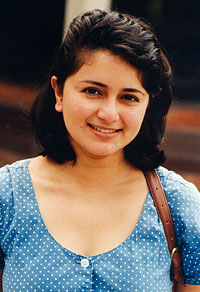 A skillful mix of history, reportage, memoir and travelogue, Manjushree Thapa's Forget Kathmandu: An Elegy for Democracy reconstructs three centuries of Nepali history as an elongated journey towards individualism and freedom. What distinguishes this book from mainstream history books is its stance: the Elegy revisits Nepali history from the point of view of a history-dweller rather than a history-broker.
A skillful mix of history, reportage, memoir and travelogue, Manjushree Thapa's Forget Kathmandu: An Elegy for Democracy reconstructs three centuries of Nepali history as an elongated journey towards individualism and freedom. What distinguishes this book from mainstream history books is its stance: the Elegy revisits Nepali history from the point of view of a history-dweller rather than a history-broker.
It is at once a celebration of the power of the literary monologue and a cry of outrage at the reality in which the present Nepali state and society are trapped. Elegy is woven around the theme that Nepal is heading towards what she calls a 'postmodern democracy'. Starting with an account of the Narayanhiti massacre and its aftermath, she goes back to trace the medieval history of chaos and intrigue in search for evidence to either validate or falsify conspiracy theories.
The author's inclination towards the postmodern is reflected in her willingness to bend, test and challenge every perceived rule and statement: an approach that also leads the reader to ponder whether postmodernism is not the very essence of that increasingly elusive democracy, which every interest group in Nepal today is frantically trying to bait and define.
The key feature of postmodernism is deconstruction. It is the rejection of the sovereign autonomous individual with an emphasis on diversified, collective, anonymous experience. Postmodernism in Nepal undergoes two distinct transformations: First, from a medieval country ruled by either the solitary Shahs or Ranas with the help of their Pandey or Thapa mukhtiyars, to a modern country caught in a continual power struggle between the royals and party leaders. The second transformation (the visibility-constraining 'haze', as Manjushree puts it) that had enveloped the country making it mandatory that it worshipped one distinct figure, is blown away to welcome the global wave of democracy into Kathmandu. The central figure of worship finally disappears, only to be replaced by endless squabbles among the various interest groups including the Maoists.
This also sets the stage for Manjushree's post-February First writings, where her cry is for 'the right to talk about everything and anything' and not to reinstate any of the ruling figures.
Not least because democracy is the breathing protagonist in almost all of Manjushree's writings, one cannot help but notice that her post-February First writings come as a natural extension of her concluding chapter in Forget Kathmandu, 'The Unfinished Revolution'. Postmodern democracy can now no longer be associated solely to the lawless and objectiveless street protests of the student unions, nor the UML's endless rostrum-gheraos, nor the Koiralas' blind clench to premiership.
Real democracy, now, must not just look like a democracy, but act like one as well: 'whereas in earlier spells of democracy, Nepalis were asked to be content with a few freedoms (assembly, speech), we now want social and economic equality as well'.
The conclusion of Forget Kathmandu somehow outpaces the rest of book and the 256.5 pages boil down to a two half-page wish list. While the diagnosis feels sound, the prescription is less persuasive, which, ironically, might reflect the current state of Nepal. Still, there are a number of weaknesses in the diagnosis. For example, the book hardly ever recalls Newar history and culture, which prevailed in Kathmandu and which the book urges us to forget. The 32-page 'History Exhibit' chapter hardly speaks of the equally vibrant histories and cultures that lived outside that memory-unworthy Kathmandu until the second last chapter when democracy starts dismantling.
The author is not alone in this peril. All Nepali today would confess to knowing less about their own selves than about the 'other'-the almighty God, the red revolution, the glamorous west, the oily sands. Every Nepali would also confess to not knowing a single name free from the pollutions of corruption and self-centredness. Is it not time now that we come to terms with our diversified pasts and presents within the boundaries of our common territories?
The Elegy is open-ended. The book needs to be read in conjunction with the rapid unravelling of the post-February First events, which might very well turn out to be the earnest forbearer of the conclusion of that 'Unfinished Revolution'.
Asthi Shakwa is a doctoral student and lives in Washington DC.
 Forget Kathmandu: An Elegy for Democracy
Forget Kathmandu: An Elegy for Democracy
by Manjushree Thapa
Penguin/Viking New Delhi, 2005
Rs 560


